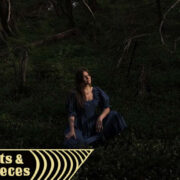Lou Turner on Lucinda Williams – Happy Woman Blues 

One of the year’s best album has come by way of Nashville songwriter Lou Turner. A more meditative counterpoint to the loose indie of her band Styrofoam Winos. By contrast her solo work is bruised and bare, but heartfelt. She takes solace in fringe characters. As I mentioned in my review earlier in the year, “Microcosmos is the kind of record that begs repeat listens, doling out hidden messages and small turns of phrase that stoke the flame with an oxygenated gust that gives life.” I reached out to Lou for a pick in the Hidden Gems series and she’s landed on a Folkways classic that, despite its status, doesn’t always get the accolades it deserves these days.
“The summer after graduating college, my friend and I were working in a bed & breakfast in West Ireland. We originally planned on a gap year of volunteering but things hadn’t quite gone as planned. After moving around a bit and looking for work, we settled into Westport for six weeks to clean rooms and nanny the owner’s kids in exchange for a place to stay and a bit of spending money. It was sometime during that transient autumn that I discovered Lucinda Williams’s second album Happy Woman Blues. The songs couldn’t have found me at a better time – they were about traveling, missing home, looking for home; songs about the angst of young womanhood and “trying hard to be a happy woman / but sometimes life just overcomes…” It was a time of intense growing pains – I was fresh-faced, freewheeling, and in this stunningly beautiful new place, but without any money or community.”

“It would take me a while to fall for her greatest hits or her Grammy-winning 1999 masterpiece Car Wheels on a Gravel Road – I didn’t have an ear at the time for the slicker production on those records (which I’ve now come to adore just as much). But Happy Woman Blues’ laid-back, rollicking sound and Smithsonian Folkways label drew me in at a time when I was reading Lomax’s The Land Where the Blues Began and seeking out Dylan outtakes; hungry for American art that was traditional and radical at the same time. I was taking myself a little too seriously, maybe, like any young artist might – and trying to write folk songs about the country I was going to return to when I ran out of money.”
“While it’s her second record, it’s the first of her original songs, backed by a six-piece no-frills country band that illuminates her Louisiana roots. I am in awe of these being her first songs – they are already doing all of the things her songs will always do, brilliantly, uniquely, and yet timelessly. The version of “I Lost It” on this record is chooglin’ and joyous (her laugh at the beginning is the most charming pre-roll studio moment). In her already distinctive delivery you can hear the hard-edged gravel that will lead to Rough Trade releasing her next record, but it’s a grit of vulnerability. Lu’s her own brand of feminine troubadour here – one minute singing about rolling through town for forgettable one night stands and the next wistfully and agelessly serenading an eternal true love. It’s hard to have a favorite track, but I think “Maria” is one of the most beautiful road songs ever, and it’s hard to believe its melody didn’t already exist centuries ago:
“The highway has always been your lover / and someday you might know his name / Maria, can you give me answer / are the songs we sing worth the broken heart”
“I was listening to this record along with Joni’s Hejira a lot while working on Microcosmos; thinking about road songs or troubadour songs written from a feminine perspective. I wanted to take things a step further into domesticity and write about exploration from the point of view of a fixed state, though this wasn’t really a conceptual goal as much as an acceptance of reality during the pandemic. It’s an ongoing, grounding touchstone and has offered so much to me as I’ve grown up with it. What I love most is that this is already classic Lucinda, through and through. She continues to evolve and embark on so many wonderful explorations sonically (have you heard her collaborations with Charles Lloyd?!) and/but ultimately continues to focus on writing incredible American folk songs in this rich literary tradition that she makes and breaks in a single line.”
Lou’s discussion of the album is spot on, and it’s true that while Williams has often garnered praise, this 1980 album doesn’t always enter into the discussion, lost in a catalog of revered works. Thankfully the album has been reissued lately by Smithsonian Folkways, and is readily available for those who haven’t heard its charms. Worth picking this up as a companion piece to Lou’s excellent new album Microcosmos out now from Spinster.
Support the artist. Buy it HERE.









